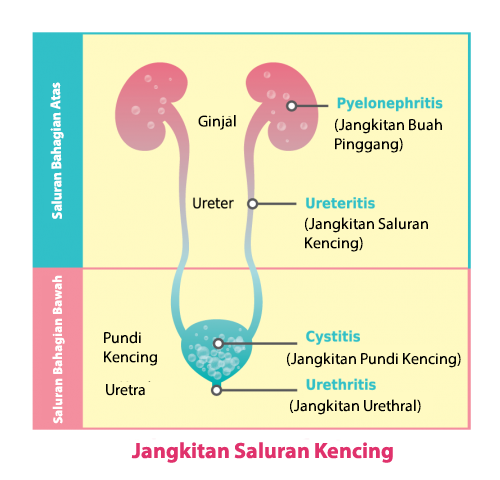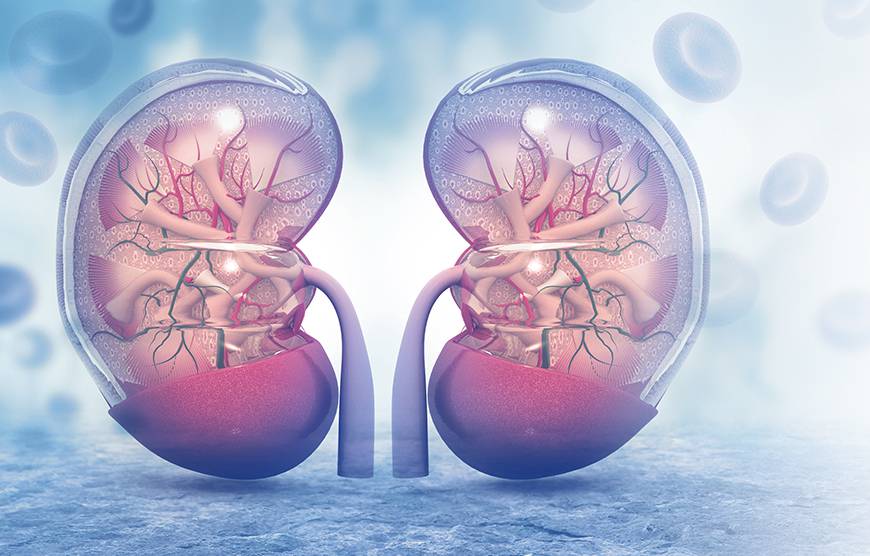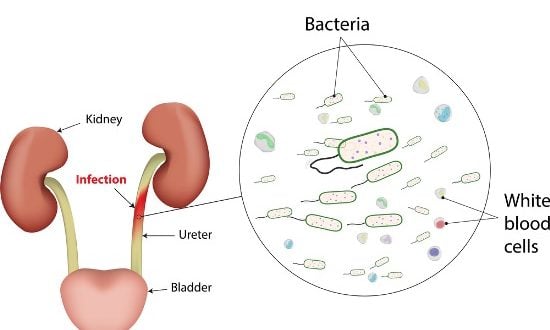Are There Any Complications From A Kidney Infection
Most people who develop a kidney infection make a full recovery if treatment is given promptly. Possible complications which occur in a small number of cases include:
- Sometimes germs from a kidney infection get into the bloodstream, particularly if treatment is delayed. This may cause blood poisoning . This can be serious or even life-threatening.
- In pregnant women who develop pyelonephritis occasionally, it may result in the baby being born early or with a lower birth weight.
- A kidney abscess can develop. This is a collection of pus that forms within the kidney.
- The infection can sometimes cause some permanent damage to kidney tissues.
These complications are uncommon but may be more likely if:
- You become severely ill with the kidney infection.
- You have kidney stones.
- Your immune system is suppressed – for example, if you have cancer, if you are taking medication such as steroids or chemotherapy, or if you have AIDS.
- You have poorly controlled diabetes.
- You are an older person .
- You are pregnant.
Emphysematous pyelonephritis is also a rare complication. In this condition the kidney tissues are rapidly destroyed by the infection and the bacteria can release toxic gases which can build up in the kidneys. You become very unwell if you develop this complication. This complication seems mostly to affect people who have poorly controlled diabetes.
Understanding Your Urinary Tract
Your urinary tract, or urinary system, comprises several different organs designed to extract, hold, and transport waste from your system in the form of urine. The main organs involved in the urinary system include:
- The kidneys: These two organs sit on each side of your body, generally around the waist. They filter out excess water and waste from your blood to create urine.
- The ureters: These two thin tubes run between the kidney and bladder, transporting urine to the bladder.
- The bladder: This organ stores urine until it reaches a certain level, at which point you feel the need to pee. The body voluntarily contracts the muscles that line the bladder to urinate.
- The urethra: This thin tube connects the bladder to the outside of the body. When you urinate, a muscle called the urinary sphincter relaxes as your bladder contracts to remove urine from your body.
Urinary tract infections happen when bacteria infect any part of your urinary system, but they are most common in your lower urinary tract, comprising the urethra and bladder.
Causes Of Kidney Infection
Pyelonephritis is more common among women than men. Escherichia coli, a type of bacteria normally in the large intestine, causes about 90% of cases of pyelonephritis among people who are not hospitalized or living in a nursing home. Infections usually ascend from the genital area through the urethra to the bladder, up the ureters, into the kidneys. In a person with a healthy urinary tract, an infection is usually prevented from moving up the ureters into the kidneys by the flow of urine washing organisms out and by closure of the ureters at their entrance to the bladder. However, any physical blockage to the flow of urine, such as a structural abnormality, kidney stone, or an enlarged prostate gland, or the backflow of urine from the bladder into the ureters increases the likelihood of pyelonephritis.
The risk of pyelonephritis is increased during pregnancy. During pregnancy, the enlarging uterus puts pressure on the ureters, which partially obstructs the normal downward flow of urine. Pregnancy also increases the risk of reflux of urine up the ureters by causing the ureters to dilate and reducing the muscle contractions that propel urine down the ureters into the bladder. Occasionally, a catheter that remains in the bladder can cause pyelonephritis by allowing bacteria to enter or remain in the bladder.
Recommended Reading: Can A Kidney Infection Cause Diarrhea
When To See A Doctor
If you have signs of a kidney infection, you should see a doctor right away. Again, a kidney infection is seriousit can sometimes lead to a dangerous, life-threatening health condition called , the NIDDK says. Even if your infection doesnt progress to that, a kidney infection can become chronic, i.e., long-lasting, and can cause permanent damage to your kidneys, the NIDDK says. Kaufman recommends heading to your local urgent care facility or emergency room if you have signs of a kidney infection.
How Long Does A Uti Last

Save Money On Absorbent Products! Check Out These Offers From Our Trusted Partners.
If you have a UTI, its best to get it treated right away before any complications develop . Its possible for a UTI to get better on its own, but most of the time, it wont. While home remedies can help ease some of the discomfort, a doctor can prescribe you an antibiotic that is a much quicker and more effective treatment. An antibiotic will start working immediately and, depending on how complicated your UTI is, may clear it up in a matter of days. Be sure to always take your medication how your doctor prescribes.
Recommended Reading: Can Miralax Cause Kidney Stones
Will Uti Go Away On Its Own
Antibiotics are an effective treatment for UTIs. However, the body can often resolve minor, uncomplicated UTIs on its own without the help of antibiotics. By some estimates, 2542 percent of uncomplicated UTI infections clear on their own. In these cases, people can try a range of home remedies to speed up recovery.
What Is A Uti Anyway
A UTI, or urinary tract infection, happens when bacteria enters into any part of your urinary system, which includes the urethra, the bladder, the kidneys or the uterus. If not flushed out of the system, the bacteria can lead to an infection, or a UTI.
If youve ever had a UTI , you probably havent forgotten the symptoms. UTIs are very unpleasant, to say the least, and are often accompanied with one or more of the following:
-
A burning sensation when urinating
-
A strong urge to urinate often, usually passing only small amounts of urine at a time.
-
Cloudy and/or strong smelling urine
-
Pelvic pain
Read Also: Where Does Kidney Cancer Metastasis
What Do I Do If I Have One
If you notice any signs of a UTI or kidney infection, visit your doctor ASAP. He or she will probably take a urine sample, and possibly a blood test, and give you a prescription for antibiotics. Although over-the-counter pain-relievers like AZO can make you more comfortable while you wait for the drugs to kick in, they will not treat the infection.
Usually, antibiotics plus plenty of liquids will get you better in no time. And as with most things, the earlier its caught, the easier its treated and the faster youll recover.
While its true that some women do get UTIs more often than othersand some even get them chronicallyno one is immune. And unfortunately, infections dont care whether or not theres room for them on your calendar. As I learned, not everything gets better with time, tea, and wishful thinking. So keep a lookout for the symptoms, keep an open mind when self-diagnosing, and remember: if you dont take care of it now, youll pay for it later.
What Are The Symptoms Of A Kidney Infection
Symptoms usually develop quickly, over a few hours or so, and may include:
- Pain in a loin or flank. .
- High temperature which may cause shivers.
- Feeling sick and/or being sick .
- Diarrhoea.
- Blood in the urine.
- There will also usually be symptoms of a bladder infection – for example, pain on passing urine, and going to the toilet often.
Not all of the symptoms may develop, and sometimes a kidney infection can just cause vague symptoms. For example, just feeling generally unwell but not being able to say why.
In older people a kidney infection may cause confusion. This is why a urine test is often done when an elderly person suddenly becomes confused or appears generally unwell.
You May Like: Can You Have 4 Kidneys
Is 1 Liter Of Orange Juice Bad For You
If you eat a balanced diet at other times during the day Specifically, if you get the proper amount of calories, all of your essential vitamins, proteins, carbs, fat, and other nutrients, but you happen to have an unusual dinner habit where you only drink a liter of orange juice, then you will be just fine.
Signs Of A Kidney Infection
What does a kidney infection feel like? According to the NIDDK, the most common kidney infections symptoms are:
Nausea
Vomiting
But depending on a persons age, they may not experience all of these kidney infection symptoms. Children younger than two may only experience high fever as a sign of kidney infections, the NIDDK says, and people older than 65 might only present with cognitive issues, like confusion, hallucinations, and disorganized speech.
Don’t Miss: Fluid Buildup Around Kidney
What Happens If A Uti Spreads To Your Kidneys
4.5/5UTIswhenyourIfUTIsspreadyour kidneyskidneykidney
Keeping this in view, how do you know if a UTI has spread to your kidneys?
Infection can spread up the urinary tract to the kidneys, or uncommonly the kidneys may become infected through bacteria in the bloodstream. Chills, fever, back pain, nausea, and vomiting can occur. Urine and sometimes blood and imaging tests are done if doctors suspect pyelonephritis.
Beside above, how long does it take for a UTI to spread to kidneys? Most of the time, you will need to take an antibiotic to prevent the infection from spreading to the kidneys. For a simple bladder infection, you will take antibiotics for 3 days or 7 to 14 days .
Besides, how does urinary tract infection affect the kidneys?
Bacteria that enter your urinary tract through the tube that carries urine from your body can multiply and travel to your kidneys. This is the most common cause of kidney infections. Bacteria from an infection elsewhere in your body also can spread through your bloodstream to your kidneys.
Can a UTI cause permanent kidney damage?
If you don’t treat a UTI, a long-lasting kidney infection can hurt your kidneys forever. It can affect the way your kidneys function and lead to kidney scars, high blood pressure, and other issues. Sometimes it can even be life-threatening. You’ll take antibiotics to treat a kidney infection.
What Is The Outlook For Kidney Infections

With treatment, the outlook for kidney infections is very positive. It is vital that you take all of any prescribed medications for the infection. You may begin feeling better shortly after beginning a treatment, but still need to take the entire prescribed treatment.
Last reviewed by a Cleveland Clinic medical professional on 05/22/2019.
References
- National Kidney Foundation. Accessed 5/23/19.Urinary Tract Infections
- National Institute of Diabetes, Digestive and Kidney Diseases . Accessed 5/23/19. Pyelonephritis: Kidney Infection
Read Also: What Is The Functional Unit Of The Kidneys
Causes Of Utis Vs Causes Of Kidney Infection
Your urinary tract is normally well equipped to prevent infections. The regular passage of urine helps to flush pathogens out of the urinary tract.
When bacteria make their way into your urinary tract and begin to multiply, UTIs occur. This can lead to symptoms. These bacteria have often come from your gastrointestinal tract and spread from your anus into your urinary tract.
Women are more likely to develop UTIs than men. This is because the female urethra is shorter than the male urethra and closer to the anus. Bacteria have a shorter distance to travel in order to establish an infection.
Treatment And Medication Options For Kidney Infection
Kidney infections are treated with antibiotics, either oral or intravenous , depending on the severity of your infection and its symptoms.
People with severe illness may need to be hospitalized for several days or longer for initial treatment. During this time, you may receive IV antibiotics in addition to fluids while your medical team monitors you closely.
The oral antibiotics prescribed for kidney infection generally must be taken for 7 to 14 days, to make sure all of the bacteria causing the infection have been killed. Its most common for your doctor to prescribe a 14-day course of antibiotics.
For reasons that arent fully understood, kidney infections in men are often resistant to treatment and may require as long as six weeks of antibiotic therapy.
Your doctor may order follow-up tests after antibiotic treatment to make sure you no longer have an infection.
You May Like: Miralax And Kidneys
How Are Kidney Infections Diagnosed
Two common laboratory tests are performed to diagnose kidney infections . A urine sample is examined under a microscope to determine if white and/or red blood cells are present. The urine is also sent to the lab to see if bacteria grow in a urine culture. If a person is very sick, blood cultures may also be sent. The strain of bacteria that are cultured will determine the type of therapy used in your treatment.
Pyelonephritis can often be treated without X-ray studies, unless your doctor suspects there may be an addition problem. CT scans produce images of structures and organs and these scans are usually done without contrast . A renal ultrasound may sometimes suffice for evaluation.
What Can I Do To Help Prevent My Child From Getting A Kidney Infection
If you suspect your child has a UTI, get them prompt medical treatment to help prevent the UTI from turning into a kidney infection. Here are some tips for preventing UTIs.
While preventative antibiotics have been found to reduce the number of recurrent UTIs, there isnt any evidence that their use decreases the risk of kidney infection or scarring. Uncircumcised boys that are less than one year old are ten times more likely to get UTIs than circumcised boys, but by age two the risk decreases and circumcision does not have an effect on infection rates.
Read Also: Can Seltzer Water Cause Kidney Stones
Who’s Most Likely To Get A Kidney Infection
Women and children are most at risk of developing a kidney infection, as well as other urinary tract infections such as cystitis.
In women, the urethra is closer to the anus than in men, making it easier for bacteria from the anus to enter the urethra accidentally. The female urethra is also much shorter than the male urethra . This makes it easier for bacteria to reach the bladder and move into the kidneys.
Other factors can also put you more at risk of developing a kidney infection, including:
Risk Factors For A Kidney Infection
There are a few things that can up your risk factor of contracting a kidney infection, according to the Mayo Clinic, and some you have zero control over:
-
Having avagina. The urethra, that small tube that carries urine out of your body, is shorter in people with vaginas than it is in people with penises. That makes it easier for bacteria to travel from outside your body into the bladder. Your urethra is also close to your vagina and anus, which opens you up to more chances that bacteria from one of those areas will get into your urinary tract.
-
Having something blocking your urinary tract. That can be anything that slows down the flow of urine or makes it hard for you to fully empty your bladder when you pee, like a kidney stone.
-
Having a weak immune system. Having an underlying medical condition like diabetes or HIV, or using medications that tamp down on your immune system, can increase your risk.
Other potential risk factors include having damage to the nerves around your bladder, using a urinary catheter for the first time, and having a condition like vesicoureteral reflux, which causes urine to flow the wrong way, the Mayo Clinic says.
Also Check: Can You Have 4 Kidneys
Symptoms Of Urinary Tract Infections
The symptoms of a basic urinary tract infection often include:
- Dark, cloudy urine that may appear red or pink from blood
- Painful or burning urination, a condition known as dysuria
- An urgent and frequent need to urinate
- A small amount of urine when you do go to the bathroom
- Urine that smells bad
- Confusion, particularly in more elderly patients
- More intense feelings of general illness
If you are experiencing symptoms of a kidney infection seek medical attention immediately. The sooner you receive treatment the more likely you are to prevent long term damage and recover faster.
When To Seek Medical Advice

Contact your GP if you have a high temperature, persistent pain, or if you notice a change to your usual pattern of urination. Contact your GP immediately if you think your child may have a kidney infection.
If you have blood in your urine, you should always see your GP so the cause can be investigated.
Kidney infections require prompt treatment with antibiotics to help relieve symptoms and prevent complications developing.
Your GP can carry out some simple tests to help diagnose a kidney infection.
See diagnosing kidney infections for more information
You May Like: What Std Causes Kidney Pain
How Do You Know When A Uti Becomes A Kidney Infection
When you do not see a doctor, a urinary tract infection can swiftly turn into a kidney infection, which can be very serious to your long-term health.
Urinary tract infections are one of the most common types of infection, second only to respiratory infections. They account for over 8.3 million visits to hospitals and health care providers each year. An untreated UTI may lead to a kidney infection, this is a potentially life-threatening condition.